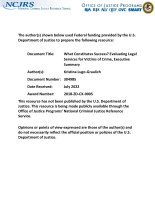Program evaluation
Evaluation of Harris Center Crisis Call Diversion Program
Improving Outcomes for Child Sex Trafficking Victims, Phase 2: A Rigorous Outcome Evaluation of Love146’s Long-Term Services (LTS) Program
Phased Evaluation of an OVC-Funded National Resource Center: Assessing VictimConnect’s Implementation and Outcomes for the Victim Service Field
The Adaptation and Evaluation of the Fourth R Youth Dating Violence Curriculum for Indigenous Communities
Inter-laboratory variation in interpretation of DNA mixtures
Investigating Impulsivity as a Root Cause of School Violence: A Systematic Review and Meta-Analysis
Criminal Justice Testing and Evaluation Consortium
Preparing Pre-Service Teachers To Manage Behavior Problems in the Classroom: The Feasibility and Acceptability of Using a Mixed-Reality Simulator
Cultivating Healing by Implementing Restorative Practices for Youth: Protocol for a Cluster Randomized Trial
Intimate Partner Abuse Solution Programs: Identifying High-Priority Needs Within the Criminal Justice System for Programs Focused on Intimate Partner Violence Prevention
An Evaluation of Youth Mental Health First Aid Training in School Settings
Use and Impact of the Wisconsin Bullying Prevention Program Assessment Tool in Addressing Middle School Bullying
Examining the Relative Utility of PBIS Implementation Fidelity Scores in Relation to Student Outcomes
NIJ Multisite Impact and Cost-Efficiency Evaluation of Veterans Treatment Courts
Formative Evaluation of a Hospital-based Violence Intervention Programs and Victim Services in Chicago
Research Abstract: National Institute of Justice's Multisite Evaluation of Veterans Treatment Courts
A hidden cost of convenience: Disparate impacts of a program to reduce burden on probation officers and participants
What Constitutes Success? Evaluating Legal Services for Victims of Crime, Executive Summary
What Constitutes Success? Evaluating Legal Services for Victims of Crime, Final Site Report: Oregon Crime Victims Law Center
What Constitutes Success? Evaluating Legal Services for Victims of Crime, Final Site Report: Maryland Crime Victims Resource Center
What Constitutes Success? Evaluating Legal Services for Victims of Crime, Final Site Report: Arizona Voice for Crime Victims
Evaluation of Technology-based Advocacy Services (ETA): Technical Report, Executive Summary
Evaluation of Technology-based Advocacy Services (ETA): Technical Report
Tribal Crime, Justice, and Safety, Part 1
Research indicates that Native American persons experience crime victimization at higher rates than non-Native people. Furthermore, the unique position of American Indian and Alaska Native tribes as both sovereign nations and domestic dependents of the U.S. creates jurisdictional complexities in responding to crime, justice, and safety. Senior social and behavioral scientist Christine (Tina) Crossland discusses NIJ’s research on these topics, especially on the prevention of violence towards American Indians and Alaska Natives. Communications Assistant Stacy Lee Reynolds hosts.











